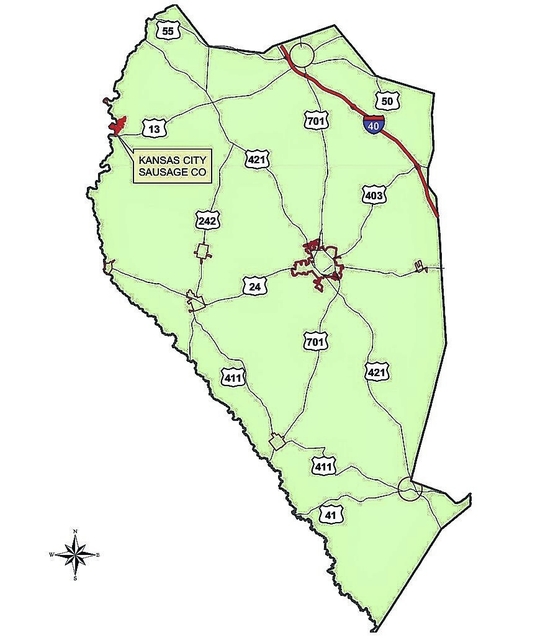

Local officials are touting this week’s announcement of a major industry locating to Sampson, saying it will not only fill a void left by the departure of another, but also bring increased tax base, jobs and production to the county — all due to strong partnerships at the local and state level.
Kansas City Sausage LLC put any speculation to rest Tuesday, officially announcing the development of a state-of-the-art sausage production plant with a taxable investment of nearly $45 million and 177 new jobs, 164 of those in 2016. The expanded and renovated facility will be located at the site of the former Martins Abattoir & Wholesale Meats in northwest Sampson County off U.S. 13 (Fayetteville Highway), purchased by Kansas City Sausage in April 2014.
It is anticipated that demolition of the existing production facility will begin immediately, with construction of the new facilities to be completed by June 2016.
Sampson County officials were quick to acknowledge that the successful recruitment of Kansas City Sausage to the community was the result of the collaborative efforts of local, regional and state partners. Board of Commissioners chairman Billy Lockamy commented that the Kansas City Sausage project was a prime example of how economic development should work.
“The initiative, drive and dedication of economic development, public works, management, legal and finance staff provided us an opportunity to marry our agricultural resources with a company who could benefit from them,” Lockamy stated. “Our partnerships with neighboring counties and organizations, and the State of North Carolina’s grant dollars will allow us to capitalize on that opportunity and bring much needed jobs and tax base to our community.”
The 90,000 square foot comprehensive operation — from live animal harvest through finished product shipping — will include a hog slaughtering plant that will process between 700 and 1,000 hogs per day, as well as a pork sausage processing plant which would annually produce 50 million pounds of finished product.
The project is a 50/50 joint venture partnership between Kansas City Sausage, LLC, which has operations in Kansas City, Mo., and Des Moines, Iowa, and Smithfield Foods, Inc., a global food company with existing operations in Sampson County.
The partnership capitalizes on the strengths of each company in their individual business sectors as well as the region’s position as a national leader in swine production, local officials said.
In order to attract the sizable plant, two grants totaling $1 million — $500,000 grants from the N.C. Rural Infrastructure Authority’s Economic Infrastructure Program and Community Development Block Grant-Economic Development Program — were able to be obtained thanks to partnerships between counties and with the state.
Those funds will help cover the estimated $1.2 million cost for the construction of a pumping station and pipeline that will connect the plant to the Northern Cumberland County Regional Sewer Authority station near Falcon, along with system upgrades to accommodate the volume generated by the plant.
“One critical element in this project is the extension of 14,700 linear feet of sewer infrastructure to serve the new plant,” said John Swope, director of the Sampson County Economic Development Commission. “This would not would not have been possible without the willingness of the Cumberland County Board of Commissioners, the Fayetteville Public Works Commission and the Northern Cumberland County Regional Sewer (System) to consider infrastructure improvements which will allow the production plant to connect to the NORCRESS sewer system.”
Local officials noted the hard work of many in Sampson and Cumberland counties, as well as at the state level, in realizing that funding needed for a key portion of a project that will benefit Sampson for years.
“We appreciate the generosity of the Office of the Governor, the N.C. Department of Commerce Rural Development Division, as well as the support and assistance provided by the Economic Development Partnership of North Carolina and the Office of State Sen. Brent Jackson in obtaining these grant funds,” said Swope. “They are an investment in the economic viability of our community.”
The investment in jobs, building and equipment, as well as the increased demand for local hog production, will be a strong boost to Sampson County’s agricultural economy, local officials said. Lockamy wished Kansas City Sausage the same longevity enjoyed by its site predecessor Martins Meats, a family business that endured for more than a half century in Sampson.
“We look forward to seeing Kansas City Sausage prosper here in our community for their own half century,” Lockamy attested.
In consideration of Kansas City Sausage’s pledged investments and job creation commitments, the Sampson County Board of Commissioners in April approved a performance-based grant back incentive package of $823,308 for the first five years of the plant’s operation. That is 27 percent of the industry’s anticipated $3.03 million annual tax levy, leaving the county with approximately $2.2 million in remaining tax revenue over the course of the first 10 years.
At that same April meeting, a separate incentives package was approved for Rheinfelden Americas, which purchased the Aludisc building and equipment in Clinton at the end of last year with the intention to run a renovated and expanded aluminum disc production facility. The company proposes to create 69 total jobs with an average wage of $35,577 and bring $12 million in taxable investment to Sampson.
At that time, commissioners offered their thanks to Swope and industry officials considering Sampson as a possible site. Swope reciprocated, saying the projects stood as an example of many cogs come together locally to make the economic development machine run. It’s not just about one department, he stated.
“These two projects are another example of how economic development works,” Swope said. “We have our leadership support and your administrative team, as well as other people like (Public Works director) Lee Cannady. I appreciate it. We’ve got a great team that makes me feel like these things can get done.”

